
3 Tipps für Surfanfänger
Ihr wollt unbedingt Surfen lernen uns wisst noch nicht so richtig wie? Im Dezember 2021 habe ich kurzerhand eine Surfschule besucht und hier findet ihr meine 3 wichtigsten Erkenntnisse die ich hier gewonnen habe!
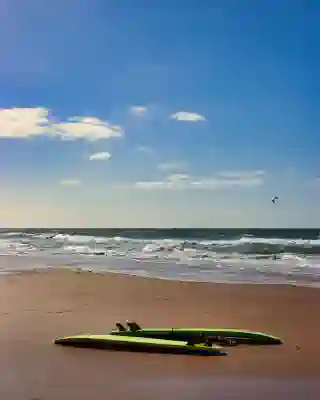
3 Dinge, die ich vor dem Surf-Camp gerne gewusst hätte
“Fahrt ihr ruhig mit dem Bus, ich nehme die nächste Welle.”
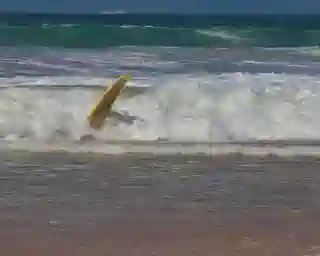
So ähnlich lautete der Plan, der uns für eine Woche voneinander trennte. Während Georg und Momo weiterhin die Abenteuer in Spanien erkundeten, hatte ich, Jo, beschlossen, mir ein großes Ziel für dieses Jahr zu setzen: Surfen lernen!
Ich habe mir dafür einen Ort an der Süd-Spanischen Atlantikküste gesucht und mich für ein einwöchiges Yoga-Surf-Programm entschieden.
Dabei sind mir drei wichtige Dinge aufgefallen, die ich vorher gerne gewusst hätte.
Surfen ist nicht immer möglich
(vielleicht wisst ihr es bereits, ich wusste es nicht). Ich dachte, wenn ich den ganzen Tag Zugang zum Surfbrett hätte, würde ich es bestimmt auch die ganze Zeit nutzen können. Aber das war ein Irrtum! Gezeiten, Wind aus verschiedenen Richtungen und dessen Stärke beeinflussen das Surfen erheblich. Zu viel Wind ist tatsächlich kontraproduktiv! Das erste, was ich also lernen musste, war, dass Surfen eine Morgenaktivität ist. Im Laufe des Tages nimmt der Wind stetig zu, da sich das Land stärker erwärmt als das Meer. Das verändert die Wellen, macht sie unbeständiger, steiler oder deformiert sie. Natürlich variiert dies je nach Ort, Kontinent und Jahreszeit. Aber hier in Spanien kann man in der Regel davon ausgehen, dass der Morgen die beste Zeit fürs Surfen ist. Außerdem ist Surfen ziemlich kräftezehrend. Nach drei Stunden auf dem Brett seid ihr erschöpft und froh, nach dem Mittagessen nicht noch einmal aufs Brett steigen zu müssen.
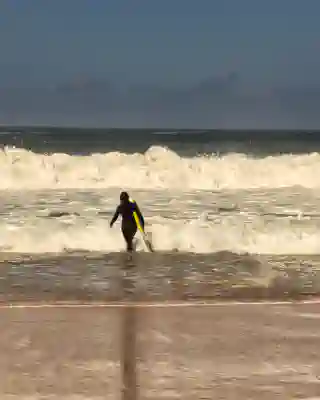

Surfen und Yoga
Es steht außer Frage, dass Surfen und Yoga sich gut ergänzen. Schon der Sonnengruß enthält wichtige Elemente, die beim Aufstehen auf dem Surfbrett hilfreich sein können. Was ich jedoch nicht wusste (siehe Punkt 1), ist, dass es am besten ist, morgens zu surfen. Wenn der Tag jedoch bereits um 8 Uhr mit Morgen-Yoga beginnt und man auch noch etwas essen möchte, kommt man vielleicht erst gegen 10:30 Uhr ins Wasser. Das ist ein ziemlich straff getakteter Tag. Daher hier ein Tipp: Yoga ist eine gute Ergänzung, aber eher abends als Abkühlung. Versucht, Yoga flexibel zu integrieren oder erkundigt euch im Surf-Camp, wie das Yoga-Surf-Verhältnis gestaltet ist, damit ihr einschätzen könnt, wie gut euch das Yoga unterstützt. Außerdem solltet ihr eure eigene Energie berücksichtigen. Wenn ihr morgens nach anderthalb Stunden Yoga bereits müde seid, erwartet nicht, dass euer Körper noch Lust hat, auf ein Surfbrett zu steigen.
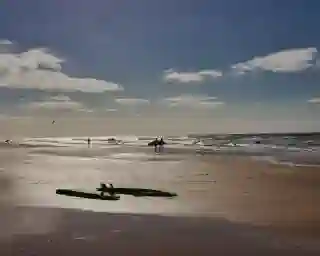
Surf-Camp, braucht man das?
Es mag klingen, als könntet ihr einfach selbst ein Brett ausleihen (oder sogar kaufen), morgens im Meer paddeln und abends an einem Yoga-Kurs teilnehmen. Nun, das geht natürlich, niemand schreibt euch vor, wie ihr das gestaltet. Aber ein Surflehrer bringt euch nicht nur bei, wie ihr auf das Brett steigt.

Neben der Surfer-Etikette (ja, die gibt es ;-) ) vermittelt er euch auch die Grundlagen der Wellenmechanik, auf denen alles aufbaut. Darüber hinaus sorgt er für Motivation, und das ist meiner Meinung nach das Wichtigste. Ich bewundere Menschen, die sich alleine Dinge beibringen können, denn das erfordert wirklich viel Disziplin und Durchhaltevermögen. Georg ist so ein Typ.
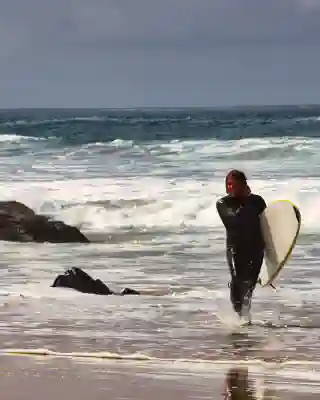
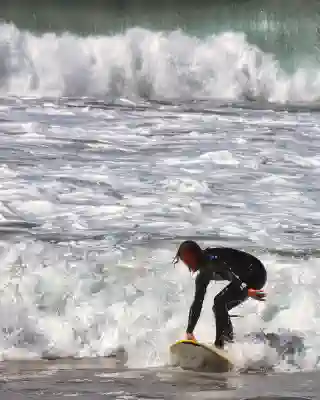
Und hier noch ein Bonus-Tipp: Wenn ihr vorhabt, Surfen zu lernen, dann macht es einfach! Wartet nicht darauf, dass es irgendwann passiert, sondern setzt euch das Ziel und legt los!